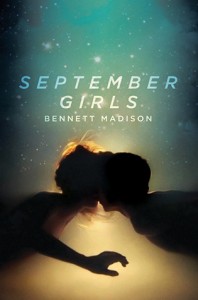July 30, 2013
“A disservice to humanity”: when unlikeable characters meet YA readers
by Dustin Kurtz

Goodreads reviewers did love the cover. Smooching: yes. Complexity: no thanks.
This has already been another banner year for stating the obvious about fiction. The theme of this year seems to be, sometimes characters think and say bad things. And masturbate.
Back in May we mentioned on MobyLives the amazing exchange between novelist Claire Messud and an interviewer for Publishers Weekly, in which Messud defends the unlikability of her protagonist with a biting disparagement of the very premise that characters should be likable. Messud wrote “We read to find life, in all its possibilities. The relevant question isn’t ‘is this a potential friend for me?’ but ‘is this character alive?'”
Messud locates part of the reader hostility to her difficult characters in the fact that both Messud and the character is question are women. “If it’s unseemly and possibly dangerous for a man to be angry, it’s totally unacceptable for a woman to be angry.”
At around the same time as that interview, but only now brought to my attention, another book that received great critical attention was being pilloried by online reviewers it caught off guard. Readers may have first looked to Bennett Madison‘s September Girls looking for a cute teen romance, but with mermaids. What they got was a slate of misogynistic and unsympathetic men, a confused male lead, and ultimately a powerfully redemptive, really quite feminist book. Oh and yes, a good dose of masturbation.
Critics, as I said, were delighted by the complexities of the book. Reviewers given galleys through Goodreads were markedly less so.
“a main character who is as big of a dick as the one he feels the need to constantly remind us he has”
“What I really don’t understand is why Madison couldn’t make any of his characters likable. Having your male characters degrade women with their words at any chance they get isn’t authentic. It’s insulting to both genders and a disservice to humanity.”
Some reviews were a bit more insightful.
“Some of that misogynistic stuff was on purpose.”
But for every glowing review on that site there is one taking issue with the book because of the attitudes and language of some characters. Why is this a problem? Well, the author’s hurt feeling aside, it leads to reviews like these mixed in among them.
“I went into this book thinking I wouldn’t be able to make it past the first chapter.”
“The reviews have made me realize just how much of a flopping crappiness this book is.”
I love that last phrase. However poor their readings of the book might be, at least these Goodreads reviewers are funny. But even more than a reductive reading, these preconceptions are a shame.
What is it about YA that makes this particular type of character—one surrounded by bad attitudes, working to see past them, very real, very embodied—so untenable? Is this a new development in the genre? Of course, the genre itself is a new designation, but what about Holden Caulfield? He’s certainly unlikeable at times. And how much prurience is built into reactions to these or any books? Is that perhaps one of the secret designations of the YA genre? Do YA readers, even very young ones, read this books with an eye to what effect they might be having on other readers?
Madison addresses some of these issues in an excellent interview with Sarah McCarry on her blog.
There are also all these questions of influence when it comes to YA that I don’t think are asked (or asked nearly as much) about books marketed to grown-ups. Do YA writers bear an added responsibility to educate or inspire because our books are aimed at younger readers? Are there ideas and themes and language that can be dangerous to our readers, who (some would argue) might not have the capacity to understand it?
These questions hinge, to me, on what’s an essentially false premise: that adults are going to think critically about a book while teenagers will sort of just receive it unquestioningly. I don’t think that’s true at all–to me, teenagers are just as critical as any other readers. Maybe more critical.
…
I think the thing that the publishing industry has done really, really well in the last ten years is that they’ve been able to present YA books as entertainment. … This is great in a lot of ways. It means sales! But the one bad thing about it is that readers can sometimes get upset when they come to a book looking for a really breezy read and it ends up not being so breezy.
In the end it may come down to this: there will always be readers out there coming to a work looking for a simple escape, and perhaps to find a friend, whether or not I or Claire Messud approve. Because they, as with any of us, are lonely. And an artifact of the way we currently market books by women, or books meant for younger readers, leads some to expect an escape or a kinship even in books that work to betray those very expectations. Nobody likes to be betrayed, least of all the lonely.
Another way to guard against loneliness, of course, is to build a circle of friends who enjoy pointing out instances of what they see as flopping crappiness to each other. These poor readers have found a different sort of company, because of but outside of this book. It’s an instinct that I find hard to fault.
Just… maybe we should all agree to send them only the more predictable galleys in the future.
Dustin Kurtz is the marketing manager of Melville House, and a former bookseller.